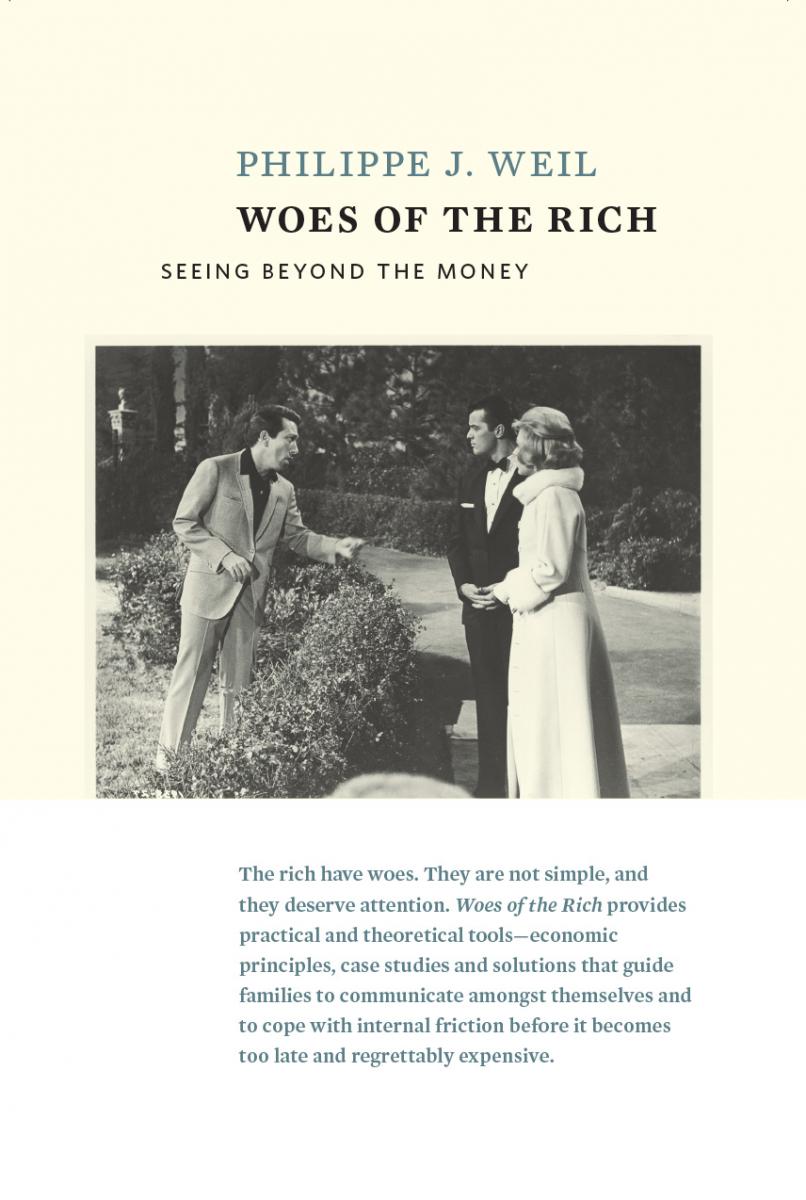Family fortunes: Philippe J Weil explores the challenges facing affluent families in his new book

A new book finds out why so many wealthy families do not transfer their assets properly to the next generation. Philippe J Weil, author and family office principal, says the answer to this question is fascinating, and doesn’t necessarily have to do with finance.
CampdenFB: What inspired you to write Woes of the Rich: Seeing Beyond the Money?
Philippe J Weil: Many professional books about issues of the affluent families have been written. Most are written for the professionals servicing such families. I thought I would write a book that is specifically written for the families themselves. In my book you can learn much about what money does to families. It can be read by the parents, siblings, children and relatives as well as friends.
 I am dealing with wealth and families for over 30 years in various tasks and, since 2001, as the owner of a multifamily office. More and more I found that the wealthy have very particular issues and I wanted to help them to understand that they are not alone in their woes and that their issues are similar with other families.
I am dealing with wealth and families for over 30 years in various tasks and, since 2001, as the owner of a multifamily office. More and more I found that the wealthy have very particular issues and I wanted to help them to understand that they are not alone in their woes and that their issues are similar with other families.
Being a member of an affluent family can be very lonely. Rich people have issues that they cannot discuss with anyone. Society looks at the rich with a mixture of jealousy and admiration. The tabloids write about the rich only when they have an economic windfall, such as a sale of business or exit, or when there are intrigues or extravaganza. Rich people are supposed to live a happy life and be ever most thankful for their luck. But the truth is different.
This book invites the reader to deal with his and his family’s issues before it is too late. We all know that only one in four families succeeds in transfering their wealth to the next generation without troubles; if you take action, you might be one of the lucky ones.
CampdenFB: How did you go about writing and researching the book?
PJW: First and foremost, it’s all about life experience. I am myself a member of an affluent family. I am working in the field of private wealth for over 30 years. For the book I gathered all the stories and experiences I heard at work, at conferences I attended and the hundreds of conversations I had with clients, friends, peers, mentors and the tabloids as well as my personal story.
CampdenFB: What are the challenges facing affluent families?
PJW: They are challenges that are particular for business owning families—succession, shared ownership etc—and others which only challenge families with financial wealth—keeping it together, trust-fund babies, etc—but most of the deep challenges are common to all affluent families.
 Society expects the affluent to be of high moral standard and to lead by example. On the other hand, the same society is also jealous and judgemental of the rich. Wealthy people, individuals as well as entire families, often have to deal with issues of entitlement, jealousy, excess or lack of self-esteem, lack of purpose and very high expectations. It is very confusing and also lonely—you do not feel to have permission to complain, to worry and to question; you are this dream everyone has!
Society expects the affluent to be of high moral standard and to lead by example. On the other hand, the same society is also jealous and judgemental of the rich. Wealthy people, individuals as well as entire families, often have to deal with issues of entitlement, jealousy, excess or lack of self-esteem, lack of purpose and very high expectations. It is very confusing and also lonely—you do not feel to have permission to complain, to worry and to question; you are this dream everyone has!
CampdenFB: Was there a family story which impressed or concerned you the most and, if so, why?
PJW: My book is full of moving stories followed by my analysis and my solutions to the issue. Unfortunately, most of them are sad and a source of concern, and learning, and make us question the “blessing” of money.
There is one particular family’s story that made a huge impression on me and will leave a mark for the reader as we can only admire this family and the way that they deal with the “blessing”.
 I consulted an older man about his last will that he had prepared. He was married for over 40 years to the same wife. When they married she was a divorcee with a daughter called Evelyn. He accepted Evelyn as his child and the couple had another three children together. Besides to his wife, he considered leaving a substantial amount of his capital to his children in such a way as for Evelyn to inherit only half of what each of the other three children did. When I asked what this division meant, he replied that Evelyn had a biological father with whom she had been in touch throughout the years. Her biological father had not remarried, he had had no additional children, and when the time came, she would inherit all his money.
I consulted an older man about his last will that he had prepared. He was married for over 40 years to the same wife. When they married she was a divorcee with a daughter called Evelyn. He accepted Evelyn as his child and the couple had another three children together. Besides to his wife, he considered leaving a substantial amount of his capital to his children in such a way as for Evelyn to inherit only half of what each of the other three children did. When I asked what this division meant, he replied that Evelyn had a biological father with whom she had been in touch throughout the years. Her biological father had not remarried, he had had no additional children, and when the time came, she would inherit all his money.
When we told the children their father’s plan the three younger children exchanged glances and said: “We feel this is wrong. Evelyn is our sister. We grew up with her from the day we were born. There was never any other feeling at home, only this Will suddenly show us our life in a different light, and we don’t feel good about it. We ask to divide the estate equally.”
Unfortunately, most families fight about estate issues and only about 30% of estate transitions go smoothly. This family is one of these few that the respect and sense of family guided them and money was secondary.
CampdenFB: What has been the reaction from readers so far?
PJW: The book came out in Hebrew back in October 2017. A wealthy second generation couple contacted me after reading my book. They needed to deal with their family governance. In preparation to the work they purchased additional copies of the book so that all family members can read the book simultaneously. Due to this preparatory reading it was easier to get started in the process of planning and implementing the family governance this family so much needed.
 Most families thank me for opening up the dialogue and to give them a tool to address the difficult topics which would otherwise not be addressed in time. It enabled them to start a conversation and to overcome some “angst” of opening Pandora's box, but postponing the issues will not solve them.
Most families thank me for opening up the dialogue and to give them a tool to address the difficult topics which would otherwise not be addressed in time. It enabled them to start a conversation and to overcome some “angst” of opening Pandora's box, but postponing the issues will not solve them.
One has to address the “woes of the rich” head on, before they become court cases and destroy the family.






